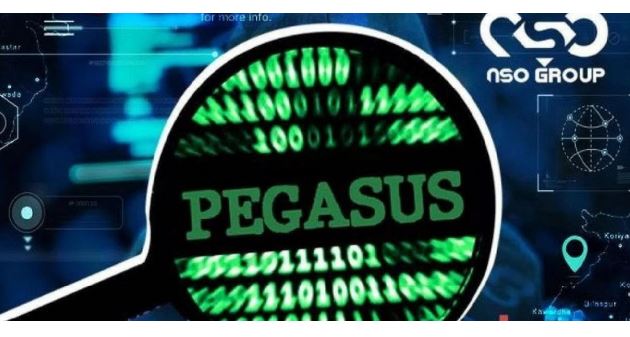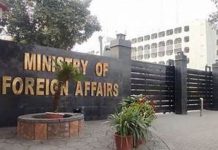Israeli lawmakers on Tuesday called for a parliamentary inquiry into the police’s alleged use of sophisticated spyware on Israeli citizens, including protesters opposed to former Prime Minister Benjamin Netanyahu, following a newspaper report on the surveillance.
Hebrew-language business newspaper Calcalist reported that in 2020, police used the NSO spyware Pegasus to surveil leaders of protests against Netanyahu, who was then prime minister. It said police also hacked the phones of two sitting mayors suspected of corruption and numerous other Israeli citizens, all without a court order or a judge’s oversight.
The Israeli police denied the allegations, saying they operate according to the law, and the NSO Group said it does not identify its clients.
Sophisticated spyware made by the Israeli company has been linked to eavesdropping on human rights activists, journalists and politicians, from Saudi Arabia to Mexico. The U.S. has barred the group from American technology, saying its products have been used by repressive regimes.
The company says its products are intended to be used against criminals and terrorists, and that it does not control how its clients use the software. Israel, which regulates the company, has not said whether its own security forces use the spyware.
The report — which cited no current or formal officials from the government, police or NSO corroborating the paper’s claims — referred to eight alleged examples of the police’s secretive signal intelligence unit employing Pegasus to surveil Israeli citizens, including hacking phones of a murder suspect and opponents of the Jerusalem Pride Parade. The report did not name any of the people whose phones were allegedly hacked by the police.
“In all the cases mentioned in the article, and in other instances, use of Pegasus was made at the sole discretion of senior police officers,” the report said. “The significance is that with Pegasus, the police can effectively hack without asking a court, without a search or entry warrant, without oversight, to all cell phones.”
The report sparked an outcry across Israel’s political spectrum, briefly uniting everyone from Jewish ultra-nationalists to Arab opposition lawmakers in shared outrage.
Cabinet Minister Karine Elharrar told Israeli Army Radio that such surveillance “was something that a democratic country cannot allow.”
Opposition lawmaker Yuval Steinitz said that surveillance of citizens by law enforcement without judicial oversight is improper and that if the claims are correct, it should be investigated.
Public Security Minister Omer Barlev, whose department oversees the police, tweeted that he would verify that police received explicit authorization from a judge to use the spyware.
The ultra-Orthodox Shas party called on the Knesset speaker to launch a parliamentary investigation. Merav Ben Ari, an Israeli lawmaker who heads the Knesset’s internal security committee, said the panel would hold a hearing into the report’s claims.
Israeli police issued a statement after the report’s publication, saying that “there’s no truth to the claims raised in the article” and that “all police operations in this field are in accordance with the law, in line with court orders and meticulous protocols.”
Amir Ohana, who was public security minister during the protests, said he had no knowledge of the reported surveillance.
The Black Flags protest movement, whose leaders were allegedly surveilled during weekly demonstrations in recent years calling on Netanyahu to resign, called on the police to release the names of the people whose phones were hacked. Spokesman Roee Neuman said the protest leaders only learned of the digital surveillance following the publication of the report.
Pegasus software surreptitiously grants full access to a person’s cellphone, including real-time communications.
Tuesday’s report was the latest blow for the company, which has faced growing scrutiny and criticism for its software’s use by repressive governments.
NSO’s software has repeatedly been blamed for cellphone surveillance of activists, dissidents and journalists. Last month, the internet watchdog Citizen Lab said dozens of journalists and human rights defenders in El Salvador had their cellphones repeatedly hacked with sophisticated spyware over the past year and a half.
In November, Citizen Lab said it had identified Pegasus software on the phones of six Palestinian human rights activists affiliated with groups that Israel has controversially claimed are involved in terrorism.
Citizen Lab has been identifying Pegasus victims since 2015, when abuses of the spyware against journalists and human rights activists were discovered in Mexico and autocratic Middle Eastern countries, including Saudi Arabia. Dozens of cases have since been uncovered, including of a dozen U.S. State Department employees in Uganda, British lawyers and a Polish senator who led the opposition’s 2019 parliamentary campaign.
The NSO Group said that it could neither confirm nor deny any specific clients, adding that “the company does not operate the system once sold to its governmental customers and it is not involved in any way in the system’s operation.”
“NSO sells its products under license and regulation to intelligence and law enforcement agencies to prevent terror and crime under court orders and the local laws of their countries,” the company said.

















